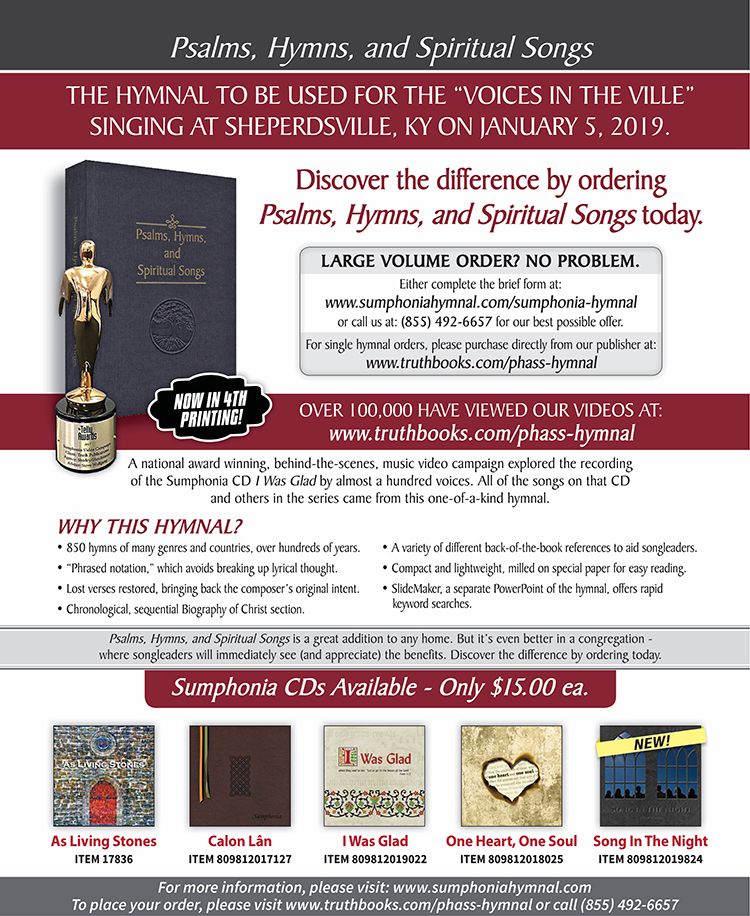

by Deborah Towles
Synopsis: As a lover of music, Deborah observes that a symphony orchestra is an example of a secular unit applying biblical principles to achieve harmonious unity of purpose.
I love classical music! For our anniversary, Gale recently took me to hear the Charlotte Symphony perform Beethoven's Fifth Symphony, an absolute favorite. Written over 200 years ago, the beauty and power of this enduring masterpiece performed by dedicated musicians moved the audience to a standing ovation. The symphony orchestra is an example of a secular unit unwittingly applying biblical principles to achieve harmonious unity of purpose. When we experience and observe this high-functioning team, we are reminded of many important spiritual lessons applying to our homes and local congregations.
A musical genius first conceived and labored to compose the symphony (Gen. 1; Eph. 1:3-5, Gal. 4:4), assigning to each instrument a specific role and responsibility (Eph. 1:20-23; 4:11-13; 5:22-6:4). He penned a detailed musical score, essential to the orchestra of his time but also to future musicians willing to reproduce his vision (2 Tim. 3:16-17; 2:2). His masterpiece stands the test of time and touches subsequent generations (1 Pet. 1:22-25). His name continues to be known and honored as new audiences are moved by his powerful work (Eph. 1:12-14).
The conductor leads his fellow musicians with conviction and purpose (Phil. 2:5-11; Eph. 1:20-23). He understands the composer's intentions, has an intimate knowledge of the score, and is committed to following it faithfully (John 17:7-8; 7:16-18). He is passionate about his purpose, working with his team to bring out their best efforts (Matt. 28:20b; Phil. 1:25). He understands that musicians' talents develop over time, expecting, even demanding progress, and never accepting mediocrity (2 Pet. 3:18; Rev. 3:14-16). He is aware of the importance of practice (Heb. 5: 12-14), both individually and as a group, so his team is well rehearsed. The conductor is visible, aware of the impact of his gestures, which are neither unintentional nor imprecise (John 14:8-10; 1 Cor. 11:1-2). He is undistracted from his purpose (John 4:34; Heb. 10:7), and demands the same focused attention from his team (Col. 3:1-2). At the end of the performance, he shares the spotlight, honoring the contribution of his musicians (Col. 3:3-4; 2 Tim. 2:11-12).
A great orchestra is composed of individuals who have so developed their skills by diligent practice (2 Tim. 2:15) that their performance appears effortless to the audience (Col. 3:23-24; 1 Tim. 4:15-16). Proficient with their instruments and in their roles, they contribute to a harmonious whole (Col. 3:17-21; Eph. 4:16). Though gifted musicians are often able to play more than one instrument, only one can be played at a time. They focus first on perfecting their part, not on the mistakes of others (1 Pet. 3:8-9; Matt. 7:3-5). They recognize, encourage and appreciate the contribution of others (1 Cor. 12:20-27), and learn to wait patiently, sometimes for hundreds of measures, for their turn to play (1 Cor. 14:33). They recognize the need to let others "shine," sharing the spotlight and rejoicing in the expert performance of others (Rom. 12:15a; 1 Cor. 12:26b); for they realize they are a part of something greater than the individual (Phil. 2:2-5; Eph. 4:11-13). They learn to concentrate on the task at hand, and do not dwell on past mistakes (Phil 3:12-14; Eph. 4:31-32). No one wants to be out of step or out of tune (1 Pet. 3:8-9; Phil 4:2); each must keep his eye on the conductor, and follow his lead (Eph. 5:23-24). In the end, all share in the glory of a job well done, knowing that their success was not achieved apart from the contribution of others (Rom. 12:3-8; Eph. 4:11-15). They recognize that the greatest honor belongs to the composer (Matt. 5:13-16).
An audience is rarely unmoved after an expert performance. Even those who consider themselves unmusical recognize that they have witnessed something extraordinary (1 Pet 2:12-15; Phil 2:15)! Such performances may serve to inspire future musicians (1 Pet. 3:1-4).
Let us be inspired to assimilate and share these truths regarding teamwork—to appreciate the genius of God's plan, to follow our leaders, to know and find fulfillment in our role, to function in harmony, to bring glory and others to our God.
Author Bio: Deborah is the wife of Gale Towles who preaches for the State Line Church of Christ in Charlotte, NC. Gale and Deborah have been married 42 years. They have four children and nineteen grandchildren. She can be reached at deboraht@carolina.rr.com.
